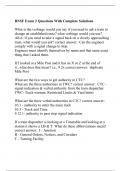Law of contract 211
Part 1: Nature & Basis of Contract
Chapter 1: Nature & Basis of Contract
1. What is contract?
Contract = agreement with enforceable obligations
- Agreement between 2/more parties
- Note: not all agreements are contracts eg. X & Y agree to play tennis on
Saturday
Distinguishing factor between contracts & non-binding agreements =
animus contrahendi: serious intention to create legally enforceable obligations
Contract requires presence of animus contrahendi
- Absence of animus contrahendi means that an agreement is not enforceable
Why? Animus contrahendi makes an agreement binding
- Determination of animus contrahendi is based on all available evidence
What happens when 1 party who lacks animus contrahendi leads another party into
reasonable belief that they seriously intended to bind themselves to agreement?
= law protects reasonable belief by upholding contract (despite absence of genuine
agreement)
2. Legally binding agreements that are not contracts
Note: not all binding agreements are contracts
- Fact that parties seriously intended their agreement to have binding legal
effect does not automatically mean that = contract
Legally binding agreements are not
contracts when fail to create obligations 1
(Some agreements are intended not to create
obligations)
, Agreements not intended to create obligations:
I. Intention of agreement is to destroy obligations (eg. Absolving agreement)
II. Intention of agreement is to honor obligations by transferring rights (eg. Real
or transfer agreement)
Obligationary agreements (1/more obligations created) =contract
= sale
= lease
Contract of sale= obliges seller X to transfer thing sold to purchaser Y, who is bound
to pay price
Why are obligationary agreements considered contracts?
- Creates reciprocal obligations
- No evidence proving lack of capacity in either X or Y (assumption that have
capacity to act)
- Performance is certain (X transfers to Y once Y has paid)
- Agreement is possible to perform because no facts suggest otherwise
- Both parties know & agree on performance each are to perform & have
consensus
- No formalities (unless agreement is required to be in certain form)
- Object of sale is not prohibited by statute or common law, therefore it is legal
Legally binding agreements that are not contracts:
Absolving agreements (obligations discharged/ extinguished) = not contract
An agreement between X & Y to cancel sale is example
Why is an absolving agreement not contract?
- No reciprocal obligations
Real or transfer agreements (rights are transferred) = not contract
2
, - Agreement of when, where, why & how to sell right = contract
But…. actual transfer of right = not contract, it is merely honoring obligation of
agreement
Transfer takes place by traditio: contains physical element (delivery of thing) +
mental element (concurring intentions to transfer & acquire ownership)
Example 1 = cession
- X has right to claim money from Y arising from contract (can also be another
source of obligation)
- X can sell right to claim money from Y to Z (3rd party)
o Transfer takes place by traditio: contains physical element (delivery of thing) +
mental element (concurring intentions to transfer & acquire ownership)
Sale of right = contract
Why? Obligationary agreement obliging X to transfer right to Z
- Sale itself does not transfer right: that is achieved by cession, which is
separate agreement entailing concurring intentions: to transfer right on X’s
part & to take transfer of it on part of Z
Example 2 = rights as form of property
- X has right of ownership of house
- X offers to sell house for R1 mil to be paid in monthly instalments for 24
months to Y (this means that Y would become owner of house when last
instalment is paid) & Y agrees
Sale agreement for house = contract
- Only once Y has fulfilled contractual obligations can acquire ownership of
house rights transferred to Y
- Contractual obligations not fulfilled= no rights transferred
- Obligationary agreement & transfer of rights is separate
- X is required to use sale agreement to transfer right of ownership to Y &
transfer of rights honoring obligation in terms of agreement
Distinction in terms of real agreements where right is being sold v where parties
agree to transfer rights:
3
, [taken from example 1]
Where X sells right to Z (to claim money) = contract
Vs
When Z claims money from Y & Y gives money = real agreement, therefore not
contract
3. Legally binding agreements that are more than just contracts
I. Marriage
- Primary purpose is not creation of obligations, therefore normal principles of
law of contract are not applicable
- Best described as agreement sui generis, giving rise to relationship that
confers on parties status of public character
II. Judgement by consent
= parties to litigation conclude agreement settling issues in dispute &
thereafter ask court to give judgement/ order reflecting terms of agreement
- Judgement/order has dual character: 1 hand= judicial act with same authority
as any other judgement or court, other hand = remains substance of contract
between parties (does have elevated status because of command of court)
III. Agreements entered into with public bodies or organs of state
- Difficultly presented: overlap between private & public law
- State enters into contract with private persons: treated as equals
- State can be treated less favourably than ordinary contracting parties:
contractual duties must yield before its public duties, as stipulated in
Constitution
4. Definition of contract
4 elements:
a. An agreement entered into
b. By 2/ more parties
c. With the intention of creating legal obligation/s
d. That law recognizes as being binding on parties
5. Requirements for valid contract
4
Part 1: Nature & Basis of Contract
Chapter 1: Nature & Basis of Contract
1. What is contract?
Contract = agreement with enforceable obligations
- Agreement between 2/more parties
- Note: not all agreements are contracts eg. X & Y agree to play tennis on
Saturday
Distinguishing factor between contracts & non-binding agreements =
animus contrahendi: serious intention to create legally enforceable obligations
Contract requires presence of animus contrahendi
- Absence of animus contrahendi means that an agreement is not enforceable
Why? Animus contrahendi makes an agreement binding
- Determination of animus contrahendi is based on all available evidence
What happens when 1 party who lacks animus contrahendi leads another party into
reasonable belief that they seriously intended to bind themselves to agreement?
= law protects reasonable belief by upholding contract (despite absence of genuine
agreement)
2. Legally binding agreements that are not contracts
Note: not all binding agreements are contracts
- Fact that parties seriously intended their agreement to have binding legal
effect does not automatically mean that = contract
Legally binding agreements are not
contracts when fail to create obligations 1
(Some agreements are intended not to create
obligations)
, Agreements not intended to create obligations:
I. Intention of agreement is to destroy obligations (eg. Absolving agreement)
II. Intention of agreement is to honor obligations by transferring rights (eg. Real
or transfer agreement)
Obligationary agreements (1/more obligations created) =contract
= sale
= lease
Contract of sale= obliges seller X to transfer thing sold to purchaser Y, who is bound
to pay price
Why are obligationary agreements considered contracts?
- Creates reciprocal obligations
- No evidence proving lack of capacity in either X or Y (assumption that have
capacity to act)
- Performance is certain (X transfers to Y once Y has paid)
- Agreement is possible to perform because no facts suggest otherwise
- Both parties know & agree on performance each are to perform & have
consensus
- No formalities (unless agreement is required to be in certain form)
- Object of sale is not prohibited by statute or common law, therefore it is legal
Legally binding agreements that are not contracts:
Absolving agreements (obligations discharged/ extinguished) = not contract
An agreement between X & Y to cancel sale is example
Why is an absolving agreement not contract?
- No reciprocal obligations
Real or transfer agreements (rights are transferred) = not contract
2
, - Agreement of when, where, why & how to sell right = contract
But…. actual transfer of right = not contract, it is merely honoring obligation of
agreement
Transfer takes place by traditio: contains physical element (delivery of thing) +
mental element (concurring intentions to transfer & acquire ownership)
Example 1 = cession
- X has right to claim money from Y arising from contract (can also be another
source of obligation)
- X can sell right to claim money from Y to Z (3rd party)
o Transfer takes place by traditio: contains physical element (delivery of thing) +
mental element (concurring intentions to transfer & acquire ownership)
Sale of right = contract
Why? Obligationary agreement obliging X to transfer right to Z
- Sale itself does not transfer right: that is achieved by cession, which is
separate agreement entailing concurring intentions: to transfer right on X’s
part & to take transfer of it on part of Z
Example 2 = rights as form of property
- X has right of ownership of house
- X offers to sell house for R1 mil to be paid in monthly instalments for 24
months to Y (this means that Y would become owner of house when last
instalment is paid) & Y agrees
Sale agreement for house = contract
- Only once Y has fulfilled contractual obligations can acquire ownership of
house rights transferred to Y
- Contractual obligations not fulfilled= no rights transferred
- Obligationary agreement & transfer of rights is separate
- X is required to use sale agreement to transfer right of ownership to Y &
transfer of rights honoring obligation in terms of agreement
Distinction in terms of real agreements where right is being sold v where parties
agree to transfer rights:
3
, [taken from example 1]
Where X sells right to Z (to claim money) = contract
Vs
When Z claims money from Y & Y gives money = real agreement, therefore not
contract
3. Legally binding agreements that are more than just contracts
I. Marriage
- Primary purpose is not creation of obligations, therefore normal principles of
law of contract are not applicable
- Best described as agreement sui generis, giving rise to relationship that
confers on parties status of public character
II. Judgement by consent
= parties to litigation conclude agreement settling issues in dispute &
thereafter ask court to give judgement/ order reflecting terms of agreement
- Judgement/order has dual character: 1 hand= judicial act with same authority
as any other judgement or court, other hand = remains substance of contract
between parties (does have elevated status because of command of court)
III. Agreements entered into with public bodies or organs of state
- Difficultly presented: overlap between private & public law
- State enters into contract with private persons: treated as equals
- State can be treated less favourably than ordinary contracting parties:
contractual duties must yield before its public duties, as stipulated in
Constitution
4. Definition of contract
4 elements:
a. An agreement entered into
b. By 2/ more parties
c. With the intention of creating legal obligation/s
d. That law recognizes as being binding on parties
5. Requirements for valid contract
4










